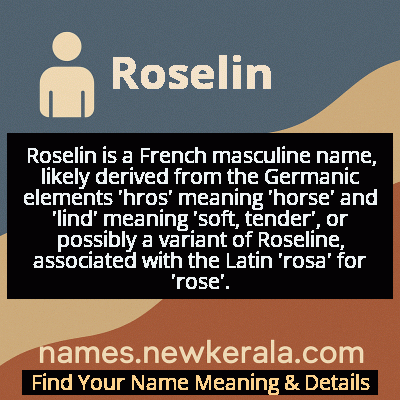Roselin Name Meaning & Details
Origin, Popularity, Numerology Analysis & Name Meaning of Roselin
Discover the origin, meaning, and cultural significance of the name ROSELIN. Delve into its historical roots and explore the lasting impact it has had on communities and traditions.
Name
Roselin
Gender
Male
Origin
French
Lucky Number
2
Meaning of the Name - Roselin
Roselin is a French masculine name, likely derived from the Germanic elements 'hros' meaning 'horse' and 'lind' meaning 'soft, tender', or possibly a variant of Roseline, associated with the Latin 'rosa' for 'rose'.
Roselin - Complete Numerology Analysis
Your Numerology Number
Based on Pythagorean Numerology System
Ruling Planet
Moon
Positive Nature
Diplomatic, friendly, artistic, empathetic.
Negative Traits
Over-sensitive, moody, indecisive, prone to self-pity.
Lucky Colours
Green, cream, white.
Lucky Days
Monday.
Lucky Stones
Pearl, moonstone.
Harmony Numbers
1, 3, 4.
Best Suited Professions
Diplomats, mediators, caregivers, artists.
What People Like About You
Cooperative spirit, friendliness, artistic talent.
Famous People Named Roselin
Roselin de la Tour
Medieval Knight
Crusader knight known for distinctive red hair and military leadership during the Third Crusade
Roselin d'Anjou
Nobleman
French nobleman who served as advisor to King Charles VII and known for his diplomatic skills
Jean-Roselin Martin
Botanist
French botanist who specialized in rose cultivation and published influential botanical studies
Roselin de Montfort
Architect
Renaissance architect who designed several notable chateaux in the Loire Valley
Name Variations & International Equivalents
Click on blue names to explore their detailed meanings. Gray names with will be available soon.
Cultural & Historical Significance
Throughout French history, Roselin maintained a steady presence in aristocratic circles while remaining relatively uncommon among commoners, creating an air of exclusivity around the name. During the Renaissance, the name experienced renewed interest as floral names became fashionable among the educated classes. The 19th century Romantic movement further cemented Roselin's poetic associations, with several French poets and writers using the name for characters representing idealized masculinity combined with artistic sensitivity. This historical trajectory demonstrates how Roselin evolved from a simple descriptive name to one carrying complex cultural connotations of nobility, artistry, and distinctive personal identity.
Extended Personality Analysis
Individuals named Roselin typically exhibit a fascinating blend of contrasting qualities that create a well-rounded and compelling personality. They often possess a deep appreciation for beauty and aesthetics, whether expressed through artistic pursuits, intellectual interests, or their approach to daily life. This artistic sensibility is complemented by strong practical intelligence, allowing them to transform creative visions into tangible achievements. Roselins are known for their quiet confidence and observational nature—they prefer to understand situations thoroughly before acting, making them excellent strategists and problem-solvers.
In social contexts, Roselins demonstrate remarkable emotional intelligence and diplomatic skills. They have a natural ability to mediate conflicts and bring people together, often serving as the peacemaker in their social circles. Their loyalty to family and close friends is unwavering, and they invest deeply in meaningful relationships. While they may appear reserved to casual acquaintances, those who know them well appreciate their dry wit, thoughtful insights, and surprising passion for their convictions. The historical association with red hair seems to manifest metaphorically in their personality—a fiery determination and intensity that emerges when they're pursuing important goals or defending cherished principles.
Modern Usage & Popularity
In contemporary naming practices, Roselin occupies a niche position as a traditional French masculine name that appeals to parents seeking something distinctive yet rooted in heritage. While it never appears in national top name lists, it maintains consistent usage in specific regions of France, particularly in Normandy, Brittany, and the Loire Valley where historical connections remain strong. Modern parents who choose Roselin often appreciate its botanical associations and literary quality, viewing it as more sophisticated than common floral names. The name has seen a slight uptick in usage among French-speaking communities in Canada and Belgium, where traditional names are experiencing renewed interest. Interestingly, the original meaning of 'red-haired' has become secondary in modern contexts, with most parents drawn to the name's melodic quality and connection to French cultural heritage rather than its descriptive origins. This evolution demonstrates how name meanings can transform over centuries while maintaining their appeal.
Symbolic & Spiritual Meanings
Symbolically, Roselin represents a beautiful synthesis of contrasting qualities—delicacy and strength, tradition and individuality, beauty and substance. The rose element connects to universal symbolism of love, passion, and perfection, while the masculine usage adds layers of protection, endurance, and quiet strength. This combination creates a rich symbolic profile of someone who appreciates beauty without being superficial, who possesses inner strength without aggression. The name evokes the image of a rose that has weathered seasons yet continues to bloom—suggesting resilience, renewal, and enduring grace.
Metaphorically, Roselin symbolizes the integration of feminine and masculine energies within an individual, representing wholeness and balance. The historical association with red hair adds symbolic weight of uniqueness, fiery spirit, and memorable presence. In broader cultural terms, Roselin represents the French ideal of 'art de vivre'—the art of living well—combining aesthetic appreciation with intellectual depth and emotional richness. This makes the name symbolic of cultivated character, where external grace is matched by internal substance, and traditional values are expressed through individual distinction.

